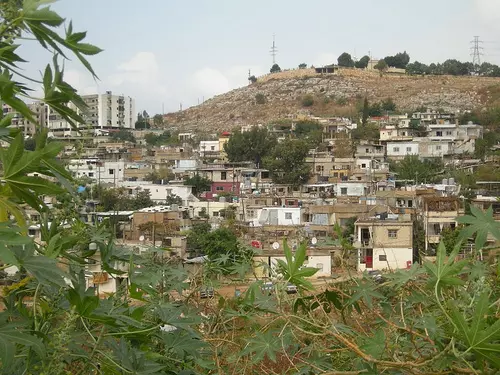DBAYEH REFUGEE CAMP Dbayeh camp is situated 12 km east of Beirut on a hill overlooking the Beirut-Tripoli highway. It was established in 1956 for refugees who originally came from the Galilee in northern Palestine. It is the only remaining Palestine refugee camp in the Eastern suburbs of Beirut . Due to its location, the camp suffered a great deal of violence and destruction during the years of civil conflict. In 1990 alone 25 percent of the shelters were destroyed or severely damaged and over 100 of its principally Christian Palestine refugee families were displaced. Although the Agency provides assistance for shelter rehabilitation and continues to provide basic services the camp is quite far from UNRWA's main service centres. UNRWA with the support from ECHO rehabilitated 6 shelters in 2003. The refugees live in severe economic hardship; many of them are unemployed. A few men are able to find work as casual labourers and some young women work in shops in the area or as cleaners. FACTS AND FIGURES There are 4,211 registered Palestine refugees; 67 families of 162 persons are registered as S.H.Cs. One part-time UNRWA health centre (two days per week) with an average of 57 patients per day; The camp's 144 pupils attend UNRWA's Carmel Elementary/Preparatory School in Burj Hammoud, East Beirut for the year 2003/2004. In addition to the facilities UNRWA provides a number of NGOs are active in Dbayeh, including Mar Mansour Association, the Little Sisters of Nazareth, and the Pontifical Mission, Popular Aid for Relief and Development (PARD). The services they provide include social and medical services and a kindergarten. Special care is provided for the young and elderly. The inhabitants of the camp have access to the RSSD loan and soft loan schemes. -------------------------------------------------------------------------------- Figures as of 31 December 2003
| PalestineRemembered | About Us | Oral History | العربية | |
| Pictures | Zionist FAQs | Haavara | Maps | |
| Search |
| Camps |
| Districts |
| Acre |
| Baysan |
| Beersheba |
| Bethlehem |
| Gaza |
| Haifa |
| Hebron |
| Jaffa |
| Jericho |
| Jerusalem |
| Jinin |
| Nablus |
| Nazareth |
| Ramallah |
| al-Ramla |
| Safad |
| Tiberias |
| Tulkarm |
| Donate |
| Contact |
| Profile |
| Videos |
Dbayeh R.C. (needs verification): dbaye camp |
Posted by issam mattar on September 28, 2008
If you are the above author of the Article, you can edit your Article by clicking the button below:
Disclaimer
The above documents, article, interviews, movies, podcasts, or stories reflects solely the research and opinions of its authors. PalestineRemembered.com makes its best effort to validate its contents.




Post Your Comment
*It should be NOTED that your email address won't be shared, and all communications between members will be routed via the website's mail server.
I would like to add that, it is true that the majority of the inhabitants are from Al Bassa in northern Palestine, which is called Galilea or Galilee.
To BECHARA DAMOUNI and JOSEPF ASSI, I am from Al Bassa and from this same camp like you. May be you remember me, and maybe not. I am the son of Abu Rajeh (First Street). It is true we left the camp over 20 years ago, but I still remember your names very well. I remember Abu Bechara Damouni, the owner of the butchers hop, and I remember Al Assi family who lived in the upper quarter over the Fouth Street by the house of Abu Firas (Yousef Ayyoub Haddad, the Palestinian writer). I would like to say to you that, it is the same thing to say, either from Al Bassa or from North Palestine or Galilea/Galilee, because Al Bassa is a village in North Palestine. And North Palestine is called Galilea/Galilee according to the Bible. You should remember that, there are other Palestinian Christians in the camp who are from Haifa, Akka, Safad and other villages in Galilea/ North Palestine.
and thank you :D